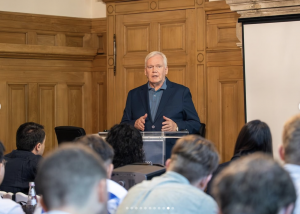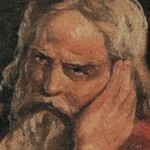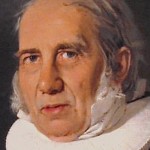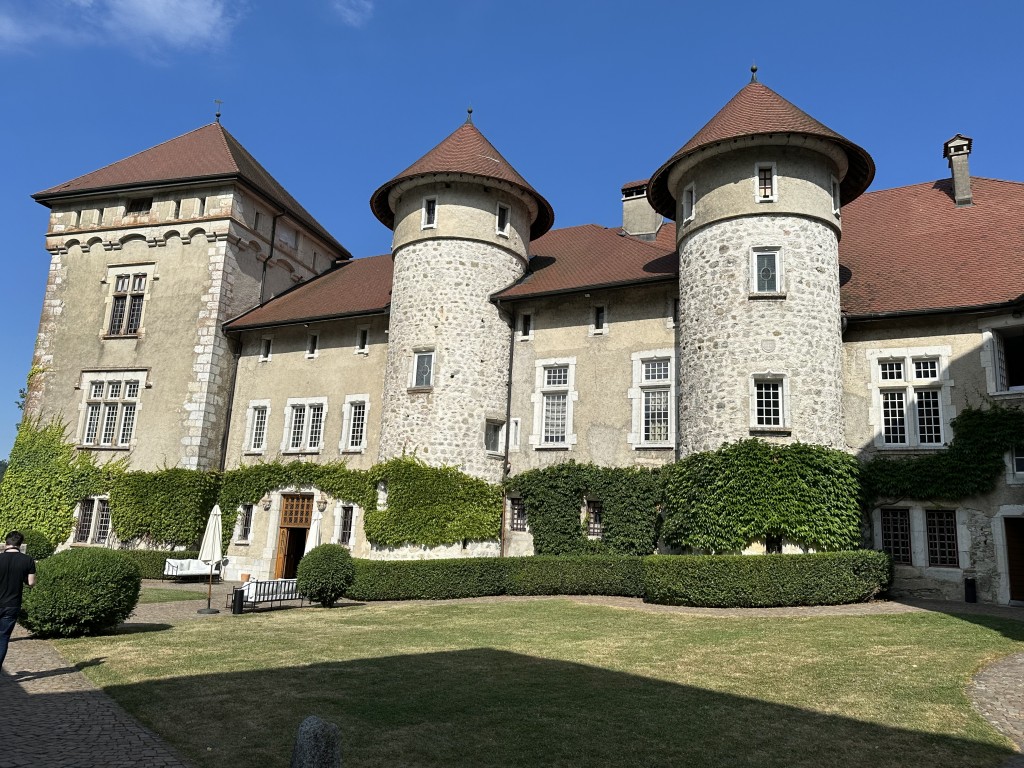 Hannes H. Gissurarson, Professor Emeritus of Politics at the University of Iceland and RNH Academic Director, gave a talk at the Summer University organised by Brussels think tank New Direction and French think tank ISSEP at Chateau de Thorens in France on 30 June to 4 July 2025. His subject was the root of conservative-liberal thought. Gissurarson pointed out that a distinction could be made between southern liberalism, originating in Roman law and the thought of St. Thomas Aquinas, and northern liberalism, originating in the customary law of the Germanic tribes and their self-government, described by Tacitus and applauded by Montesquieu (who exclaimed that European freedom was born in the forests of Germany).
Hannes H. Gissurarson, Professor Emeritus of Politics at the University of Iceland and RNH Academic Director, gave a talk at the Summer University organised by Brussels think tank New Direction and French think tank ISSEP at Chateau de Thorens in France on 30 June to 4 July 2025. His subject was the root of conservative-liberal thought. Gissurarson pointed out that a distinction could be made between southern liberalism, originating in Roman law and the thought of St. Thomas Aquinas, and northern liberalism, originating in the customary law of the Germanic tribes and their self-government, described by Tacitus and applauded by Montesquieu (who exclaimed that European freedom was born in the forests of Germany).
 This northern liberalism was articulated in the works of Icelandic chronicler Snorri Sturluson (1179–1241) who described the conflict between the Norwegian (and Swedish) kings and their subjects who insisted on the two ancient principles of government by consent and the right of rebellion. Later John Locke was to build a whole system upon those two principles, in his justification of the 1688 Revolution in Britain which was made in order to defend ancient liberties against a king who craved absolutism. This system was further elaborated by David Hume with his conception of justice, spontaneously developed as a response to limited altruism and natural scarcity, by Adam Smith with his case for free trade, and by Edmund Burke with his polemic against attempts at destroying all ancient institutions instead of reforming then gradually.
This northern liberalism was articulated in the works of Icelandic chronicler Snorri Sturluson (1179–1241) who described the conflict between the Norwegian (and Swedish) kings and their subjects who insisted on the two ancient principles of government by consent and the right of rebellion. Later John Locke was to build a whole system upon those two principles, in his justification of the 1688 Revolution in Britain which was made in order to defend ancient liberties against a king who craved absolutism. This system was further elaborated by David Hume with his conception of justice, spontaneously developed as a response to limited altruism and natural scarcity, by Adam Smith with his case for free trade, and by Edmund Burke with his polemic against attempts at destroying all ancient institutions instead of reforming then gradually.
 Gissurarson recalled that eleven years before Smith published his great treatise on the Wealth of Nations, a Finnish pastor, Anders Chydenius (1729–803], as a member of the Swedish Parliament, Diet of the Four Estates, in 1765 had published a tract with essentially the same arguments for free trade. Chydenius had also been instrumental in abolishing censorship and introducing freedom of religion in Sweden. In the nineteenth century, Swedish liberals deposed a king in 1809 and wrote a relatively liberal constitution the same year. They reinforced the rule of law, abolished the guilds and most restrictions on trade, and in 1866 replaced the Diet of the Four Estates with a Parliament. Sweden, between 1870 and 1970, experienced a high and sustained rate of economic growth and became one of the richest countries in the world.
Gissurarson recalled that eleven years before Smith published his great treatise on the Wealth of Nations, a Finnish pastor, Anders Chydenius (1729–803], as a member of the Swedish Parliament, Diet of the Four Estates, in 1765 had published a tract with essentially the same arguments for free trade. Chydenius had also been instrumental in abolishing censorship and introducing freedom of religion in Sweden. In the nineteenth century, Swedish liberals deposed a king in 1809 and wrote a relatively liberal constitution the same year. They reinforced the rule of law, abolished the guilds and most restrictions on trade, and in 1866 replaced the Diet of the Four Estates with a Parliament. Sweden, between 1870 and 1970, experienced a high and sustained rate of economic growth and became one of the richest countries in the world.
 In the nineteenth century, the third great liberal appeared, the Danish poet, pastor and statesman Nikolai Frederik S. Grundtvig (1783–1872). When the Danish king in 1848 transferred his absolute power to the people, Grundtvig saw it as a necessary task to educate the people in so-called People’s High Schools so they could become responsible citizens. He was a nationalist, but a non-aggressive one. For example, he thought that only the Danish-speaking part of the contested Schleswig should belong to Denmark. Nationality had to be chosen, not imposed. Grundtvig’s nationalism was about respecting and developing the national heritage, the history, language, literature, folk songs and folkways, of one’s own country. When Denmark had lost Norway, in 1814, and Schleswig and Holstein, in 1864, he emphasised that she should grow within her own borders, as a nation proud of her identity and achievements.
In the nineteenth century, the third great liberal appeared, the Danish poet, pastor and statesman Nikolai Frederik S. Grundtvig (1783–1872). When the Danish king in 1848 transferred his absolute power to the people, Grundtvig saw it as a necessary task to educate the people in so-called People’s High Schools so they could become responsible citizens. He was a nationalist, but a non-aggressive one. For example, he thought that only the Danish-speaking part of the contested Schleswig should belong to Denmark. Nationality had to be chosen, not imposed. Grundtvig’s nationalism was about respecting and developing the national heritage, the history, language, literature, folk songs and folkways, of one’s own country. When Denmark had lost Norway, in 1814, and Schleswig and Holstein, in 1864, he emphasised that she should grow within her own borders, as a nation proud of her identity and achievements.
Gissurarson emphasised that conservative liberalism was not only the product of individual writers, but that it was also embodied in Nordic practices, first and foremost the rule of law, and a strong civil society, full of voluntary associations and local communities. The Royal charters of the late Middle Ages also acted as constraints on arbitrary power. It showed how strong was the conservative-liberal tradition of liberty under the law that it was able to withstand both the seventeenth century assault of the kings, claiming power by the grace of God, and the twentieth century assault by Social Democrats, claiming power by the will of the people. Today, the Nordic nations are some of the freest nations economically in the world, and the happiest ones as well. They have cast off the yoke of Social democracy in the same way as they cast off the yoke of absolutism and in the same way as the English, gradually from Magna Carta in 1215 to the 1688 Revolution, cast off the Norman yoke and returned to their Saxon freedom, a part of the Germanic heritage of all Northern peoples.
Other speakers at the summer school included Hungarian professor Ferenc Hörcher who defended moderate conservatism in the spirit of Roger Scruton, Croatian MEP Stepan Bartulica who criticised the centralisation in the European Union, New Direction Senior Adviser Robert Tyler who described the conservative views on the nation state, French professor Jean Luc Coronel de Boissezon who presented the conservatism of Joseph de Maistre and Louis de Bonald, Swedish Oikos adviser Arvid Hallén who argued for an alliance between right-wing liberals and conservatives, English Professor James Orr who gave a defence of conservative values, and Mateusz Morawiecki, former Prime Minister of Poland, who discussed the current state of affairs in Europe. Many lecturers expressed worries about asylum seekers in Europe who refused to follow the laws and conventions of their host countries. This might even lead to local soft civil wars. They emphasised the conservative support for the family, church, and nation. Fifty students attended the school, while many more had applied.
As a parlour game, the lecturers were asked to name seven books that they would recommend. Gissurarson mentioned Reflections on the Revolution in France by Edmund Burke (1790), Socialism by Ludwig von Mises (1922), The Road to Serfdom by Friedrich A. von Hayek (1944), The Open Society and Its Enemies by Karl R. Popper (1945), Atlas Shrugged by Ayn Rand (1957), The Gulag Archipelago by Aleksandr Solzhenitsyn (1974), and Anarchy, State, and Utopia by Robert Nozick (1974). Both teachers and students at the summer school agreed that the venue, Chateau de Thorens, was superb.



